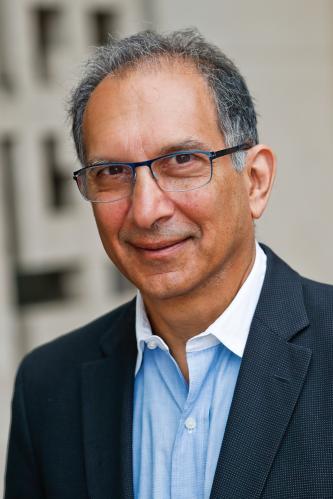Homi Kharas presented a lecture at University of Nevada, Las Vegas, on his book tracing the rise of the global middle class.
Brookings Affiliation
Research Areas
Additional Expertise
- Development economics
- Growth
- Macroeconomics
- International Trade
- Public Finance and Public debt
- Competitiveness
- Regional cooperation
- Subnational development
- Poverty alleviation
- Finance for development
- East Asia
- Sustainable development goals
Homi Kharas is a senior fellow in the Center for Sustainable Development, housed in the Global Economy and Development program at Brookings. In that capacity, he studies policies and trends influencing developing countries, including aid to poor countries, the emergence of the middle class, and global governance and the G20. He previously served as interim vice president and director of the Global Economy and Development program.
He has served as the lead author and executive secretary of the secretariat supporting the High Level Panel, co-chaired by President Sirleaf, President Yudhoyono. and Prime Minister Cameron, advising the U.N. Secretary General on the post-2015 development agenda (2012-2013). The report, “A New Global Partnership: Eradicate Poverty and Transform Economies through Sustainable Development,” was presented on May 30, 2013.
His most recent co-authored/edited books are “The Rise of the Global Middle Class” (Brookings Press, 2023), “Breakthrough: The Promise of Frontier Technologies for Sustainable Development” (Brookings Press, 2022), “Leave No One Behind” (Brookings Press, 2019), “From Summits to Solutions: Innovations in Implementing the Sustainable Development Goals” (Brookings Press, 2018), “The Imperative of Development” (Brookings Press, 2017), “The Last Mile in Ending Extreme Poverty” (Brookings Press, 2015), “Getting to Scale: How to Bring Development Solutions to Millions of Poor People” (Brookings Press, 2013), “After the Spring: Economic Transitions in the Arab World” (Oxford University Press, 2012), and “Catalyzing Development: A New Vision for Aid” (Brookings Press, 2011). He has published articles, book chapters, and opinion pieces on global development policy, global trends, the global food crisis, international organizations, the G20, the DAC, and private philanthropy.
He has served as a member of the High Level Panel on the Reform of the Development Assistance Committee (2017); the International Panel Review Committee on Malaysia’s economic and governance transformation programs (2012); the post-Busan Advisory Group to the DAC co-chairs (2011); the National Economic Advisory Council to the Malaysian Prime Minister (2009-10); and a member of the Working Group for the Commission on Growth and Development, chaired by Professor A. Michael Spence (2007-10). He was a nonresident fellow of the OECD Development Center (2009). He has consulted for various organizations including the government of Sweden; World Bank Group; the United Nations; the International Fund for Agriculture Development; the OECD; the Japan International Cooperation Agency; the Global Fund Global Fund to Fight AIDS, Tuberculosis and Malaria; the Qatar National Research Fund; and the Centennial Group. He acts as an adviser to a number of organizations.
Prior to joining Brookings, Kharas spent 26 years at the World Bank, serving for seven years as Chief Economist for the World Bank’s East Asia and Pacific region and Director for Poverty Reduction and Economic Management, Finance and Private Sector Development, responsible for the Bank’s advice on structural and economic policies, fiscal issues, debt, trade, governance, and financial markets.
-
Current Positions
- Research Partner, JICA Ogata Sadako Research Institute for Peace and Development
- Member, Independent High-Level Expert Group on Climate Finance (Songwe-Stern group)
- Member, Academic Circle in support of U.N. Special Rapporteur on the right to development
- Member, International Advisory Board of Network of Southern Think Tanks
- Chief Economist, World Data Lab
- Member, Oxfam USA Board
- Member, MCC External Advisory Council
-
Past Positions
- Member, International Finance Corporation Economic Advisory Board
- Member, Development Gateway Board
- Interim Vice President and Director, Global Economy and Development Program, Brookings Institution
- Member, High Level Panel on the Future of the OECD Development Assistance Committee
- Chief Economist and Director of Economic Policy, East Asia and Pacific Region, World Bank (and other staff positions) (1980-2007)
- Member, G-24 membership review panel (2015-2016)
- Lead Author and Executive Secretary, U.N. High Level Panel on the Post-2015 Development Agenda (2012-2013)
- Member, International Panel Review Committee on Malaysia’s economic and governance transformation programs (2012)
- Member, Post-Busan Advisory Group to the Development Assistance Committee co-chairs (2011)
- Member, National Economic Advisory Council to the Malaysian Prime Minister (2009-10)
- Member, Working Group for the Commission on Growth and Development (2007-10)
- Nonresident Fellow, OECD Development Center (2009)
- Senior Partner, Jeff Sachs and Associates (1989-1990)
-
Education
- Ph.D. Harvard University (1980)
- M.A. (1978), B.A. (1975), Cambridge University
Media and Appearances
Global public goods is now such an interesting concept because it essentially starts to recognize that we are in a single world.
Private development finance was supposed to be a game-changer for sustainable development, but it has so far fallen short of expectations.
Homi Kharas discussed how Trump’s tariff policies are changing the future of foreign affairs and America’s role in the world.
Homi Kharas hosted a series of discussions on the sidelines of the U.N. General Assembly on unlocking international development finance to better support countries in need.
Homi Kharas spoke about the history and current state of the middle class—including the power of their votes and wallets—during a presentation at the Chautauqua Lecture Series.
Homi Kharas discusses the future of sustainable development with Prime Minister Mia Amor Mottley of Barbados and United Nations Deputy Secretary-General Amina J. Mohammed.
In an interview with Stevie Rosignol-Cortez, Homi Kharas explains how the growth of the global middle class is the biggest economic megatrend of our day.
Homi Kharas delivered remarks at the 2023 U.N. High-Level Political Forum meeting on overcoming middle-income countries’ challenges in advancing the 2030 Agenda.
[Most billionaires have] accumulated their wealth because the world economy is now globalized, but to sustain a globalized world economy we need to have more inclusive growth.
